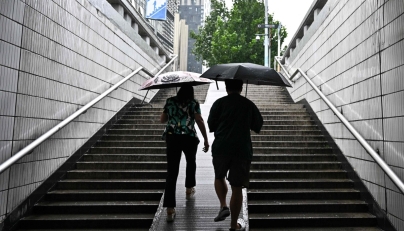Politics
China Urges US to Increase Acceptance of Chinese Students

Beijing has expressed its desire for the United States to welcome a greater number of Chinese students. This statement follows remarks made by President Donald Trump indicating plans to allow up to 600,000 students from China to enter the country. During a press briefing on Monday, Trump emphasized the importance of educational exchanges, stating, “We’re going to allow — it’s very important, 600,000 students. It’s very important.”
His comments come at a time when tensions regarding educational visas have escalated. The U.S. State Department reported that approximately 6,000 student visas have been revoked since Secretary of State Marco Rubio took office seven months ago. While the department did not specify the nationalities affected, Rubio has previously committed to a tougher stance on visa applications from Chinese students.
Beijing’s Response to Visa Policy Changes
In light of these developments, the Chinese government is calling for the U.S. to act on Trump’s assurances. Foreign ministry spokesman Guo Jiakun stated that China hopes the United States can “translate President Trump’s statement of welcoming Chinese students into concrete actions.” He urged the U.S. to “stop groundless harassment, questioning, and repatriation of Chinese students” and to effectively safeguard their legitimate rights and interests.
Guo further noted that “educational exchanges and cooperation contribute to enhancing communication and understanding among people of all countries.” This sentiment underscores China’s position on the importance of academic collaboration and the mutual benefits it can foster.
Earlier this year, Trump intensified scrutiny on foreign students, particularly targeting institutions like Harvard University. In June, he announced a ban on visas for all foreign students attending the prestigious university, which drew significant attention from both domestic and international observers.
In reaction to these actions, China’s foreign ministry reiterated its opposition to the politicization of educational cooperation, emphasizing its commitment to “resolutely safeguard the legitimate rights and interests of its overseas students.” This reflects a broader concern regarding how geopolitical tensions may impact educational opportunities and the rights of students abroad.
The ongoing dialogue between the two nations about educational exchanges is emblematic of larger issues in U.S.-China relations, where economic, political, and cultural factors intertwine. As both countries navigate these complexities, the future of Chinese students in the U.S. remains a significant topic of conversation.
-

 World5 months ago
World5 months agoSouth Korea’s Foreign Minister Cho Hyun to Visit China This Week
-

 Business5 months ago
Business5 months agoStarling Bank Plans Secondary Share Sale, Targeting $5.4 Billion Valuation
-

 Top Stories5 months ago
Top Stories5 months agoMunsang College Celebrates 100 Years with Grand Ceremony
-

 World5 months ago
World5 months agoPAS Aims to Expand Parliamentary Influence in Upcoming Election
-

 Business7 months ago
Business7 months agoKenvue Dismisses CEO Thibaut Mongon as Strategic Review Advances
-

 Lifestyle6 months ago
Lifestyle6 months agoHumanism Camp Engages 250 Youths in Summer Fest 2025
-

 Sports6 months ago
Sports6 months agoDe Minaur Triumphs at Washington Open After Thrilling Comeback
-

 Sports7 months ago
Sports7 months agoTupou and Daugunu Join First Nations Squad for Lions Clash
-

 Top Stories7 months ago
Top Stories7 months agoColombian Senator Miguel Uribe Shows Signs of Recovery After Attack
-

 World7 months ago
World7 months agoASEAN Gears Up for Historic Joint Meeting of Foreign and Economic Ministers
-

 Health6 months ago
Health6 months agoNew Study Challenges Assumptions About Aging and Inflammation
-

 Business7 months ago
Business7 months agoOil Prices Surge Following New EU Sanctions on Russia









